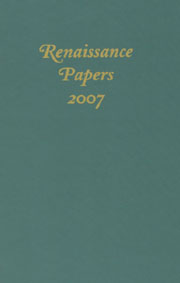Book contents
- Frontmatter
- Contents
- Renaissance Papers
- John Donne and the Practice of Priesthood
- Charity, Halifax, and Utopia: The Disadvantageous Setting of Thomas Browne's Religio Medici
- Presbyterian Church and State Before The Solemn League and Covenant
- The Flaw in Paradise: The Critique of Idealism in Margaret Cavendish's The Blazing World
- “Conceited portraiture before his Book … to catch fools and silly gazers”: Some Reflections on Paradise Lost and the Tradition of the Engraved Frontispiece
- “But Smythes Must Speake”: Women's and Commoners' Voices in the Mirror for Magistrates
- Fit for a King: The Manuscript Psalms of King James VI/I
- The Suicide of Lavinia: Finding Rome in Titus Andronicus
- The Language of Gods: Rhetoric and the Construction of Masculinity in Julius Caesar
John Donne and the Practice of Priesthood
Published online by Cambridge University Press: 12 September 2012
- Frontmatter
- Contents
- Renaissance Papers
- John Donne and the Practice of Priesthood
- Charity, Halifax, and Utopia: The Disadvantageous Setting of Thomas Browne's Religio Medici
- Presbyterian Church and State Before The Solemn League and Covenant
- The Flaw in Paradise: The Critique of Idealism in Margaret Cavendish's The Blazing World
- “Conceited portraiture before his Book … to catch fools and silly gazers”: Some Reflections on Paradise Lost and the Tradition of the Engraved Frontispiece
- “But Smythes Must Speake”: Women's and Commoners' Voices in the Mirror for Magistrates
- Fit for a King: The Manuscript Psalms of King James VI/I
- The Suicide of Lavinia: Finding Rome in Titus Andronicus
- The Language of Gods: Rhetoric and the Construction of Masculinity in Julius Caesar
Summary
DONNE'S sermons—the bulk of his literary production in the final fifteen years of his career—need to be regarded as products of his professional practice as a priest of the Church of England. A sermon is, in part but only in part, an exposition of ideas set within a structure of organization. We expect to find in a sermon by Donne a choice of texts, the employment of interpretive strategies and structures of thought, the organization of ideas into points and sections, the movement from an opening to a conclusion. But preaching also involves performance, which includes scheduling—planning for specific individuals to be present and ready to take their parts in public occasions—and publicity—the informing of the populace that the occasion will occur so that an audience might gather for the performance. It also involves setting, context, timing, and delivery; it involves a mutual contract between a speaker and an audience establishing expectations about what will happen, how people will dress and behave, and what constitutes success.
Any individual sermon is thus one component of an interconnected set of practices and arrangements. To be a professional involves mastery of a body of knowledge; presumably, in the case of a priest, this body of knowledge would include the content of the Bible as well as the Church's theology and history. But it also involves mastery of a set of practices, in Donne's case including the leading of public worship on specific times and occasions and in specific locales constructed for the purpose of such practices.
- Type
- Chapter
- Information
- Renaissance Papers 2007 , pp. 1 - 16Publisher: Boydell & BrewerPrint publication year: 2008



